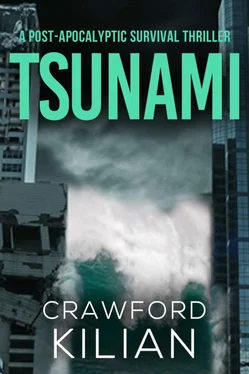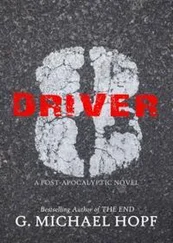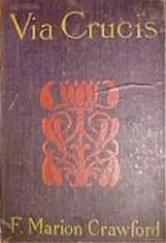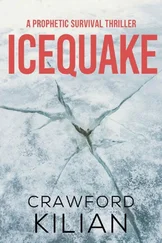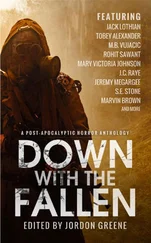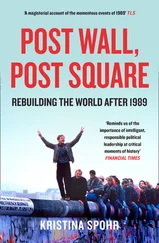“Jesus, what a day,” Sam said. “I feel like I accomplished something. I stole a bunch of drugs, kidnapped a couple guys, and hijacked a truck. And got on TV. Maybe we ought to make a career out of this, Kirstie.”
She laughed, and then couldn’t stop. Bent over, she gasped and howled. Sam started laughing too; even Einar chuckled.
They got back onto Sacramento and rolled north into thickening smoke. Einar slowed at Sacramento and University, and they looked west towards the Co-op. It was on fire. A few people moved back and forth before the flames, but they didn’t seem to be guardsmen. Farther west, the fires had coalesced into an orange blur.
They turned at the south side of the BART station, and were stopped by a pair of Berkeley policemen, one white, one black.
“Where you people headed?” the black one asked.
“The school at Francisco and San Pablo,” Kirstie answered. “We have a lot of people to feed.”
The policemen, who looked exhausted, smiled faintly. “Well, we ain’t supposed to let anyone go west of here unless they’re on official business. But I guess that means you — sure haven’t seen many officials.”
“Neither have we, except for the National Guard over on University.”
The policemen shook their heads. “Those turkeys,” the black one said. “I understand they actually opened fire on folks. Shit. The folks had more armament than the soldiers did.”
“Dear God. When?”
“About an hour ago.”
The TV van caught up with them. “They’re with us,” Kirstie said.
“Okay. Good luck.”
“You too.”
They drove slowly west, then jogged south to Francisco. Einar parked where the ambulance had been. The two black women who had been on stretcher duty that afternoon came out of the school building.
“My gosh, it’s you!” one of them exclaimed. “Where you been so long, honey?”
“Out shopping.”
“And look at what you got. Hate to think what the bill must have been. What’s this TV truck?”
“They gave us a ride down into Oakland.” Kirstie and the men got out. “They want to tape some interviews.”
“Gonna talk to some angry people, then. There was a gunfight, a real battle, over at the Co-op.”
“We heard.”
“They brought back twenty-two bodies, and sixteen wounded.”
The news crew began taping while people unloaded the truck. Kirstie leaned against the door of the cab as people jostled around her: black faces, brown faces, white faces. Hands reached out for hers.
“Thank you, ma’am,” someone said. “You done real good.”
She smiled unsurely, pleased and embarrassed. She thought about the corpses in the silent streets of Oakland and Susan Smith dying long ago in the rain. She wished Don were with her. She wished they were in Vancouver. She wished she could stop shaking.
The little boat zigzagged through masses of shattered lumber until it was alongside Ultramarine . The four black men tied up the boat at the foot of the boarding ladder and trotted briskly up to the deck.
Bill Murphy met them with handshakes. They looked around the ship with interest.
“You came through the Golden Gate!” their leader exclaimed. He was a tall, young man wearing a rust-coloured leather jacket and a broad-brimmed black hat. His name was Mitchell Eldon. “Boy, that’s dangerous. Any damage?”
“No.” Bill looked proud of his answer.
“Well. Uh, we are here to see what you can supply, like in terms of food, clothes, blankets, medical stuff, like that.”
Bill’s smile faded. He looked impassively at Mitchell, then at Owen. “I’m not sure we’ve got anything. That’s more the kind of stuff you get from the Red Cross or Civil Defence.”
“Forget them . They give us nothing yet. Everything is mightily fucked up over there. Nobody doin’ nothing.”
“Look, uh, Mitchell — I’m willing to help any way I can. But we need the supplies we carry. And I can’t just, you know, hand ‘em over to the first guy who asks.”
“Captain Murphy.” Mitchell’s voice was gentle. His eyes were masked behind dark glasses. “You see those buildings up there on the hill? That’s the housing project. We got no lights, no water, no food except for what’s left in a couple little supermarkets. We can’t get into the rest of the city ’cause of the fires and floods. We got two-three thousand folks up there with no homes now. Lots of ‘em hurt. Lots of ‘em slept out in the rain last night.”
Mitchell’s rifle, a .22, swung to point at Bill’s chest. “I am not goin’ back and tell Mrs. Debney I come back empty-handed.”
Bill stared disgustedly at the muzzle of the rifle. “And I am not going to be dictated to on the deck of my own ship.”
“Could I suggest something?” Don said. Mitchell and his friends glanced away from Bill, and the .22 wavered. “Let a couple of us go back with you to talk things over with Mrs. uh—”
“Mrs. Debney?”
“Mrs. Debney. Chances are we can help you better if we know exactly what you need, and you know what we can offer you.”
“Sure, uh-huh. And while you’re talking, your ship sails off somewheres.”
“Where to?” Don asked, waving to the north and east. Mitchell smiled wryly and nodded.
“Okay.” Everyone was relieved at the compromise. “You and the captain can come with us.”
“No, me,” said Owen. “I’m responsible for our supplies.”
“Right, fine. Let’s go.”
Six men in the little boat nearly overloaded it. Mitchell settled himself in the stern and whipped the outboard motor into life. The boat moved slowly west across India Basin.
The seiches had transformed it, churning up an archipelago of sandbars and wreckage where only mud flats had been a day ago. As they neared the shore, Don saw almost a dozen small craft — sailboats and motorboats — anchored in the shallows or moored to the irregular dike of rubble, three to five metres high, left by the seiches.
“They was floatin’ all over,” one of the young men said. “We went out and brought ‘em in las’ night and this mornin’.”
“Weren’t you worried about the seiches — the waves?” Owen asked. “It must have been pretty rugged, at least last night.”
“Aw well, you know, it was kind of fun.” The young man half smiled at the boats and looked up through his sunglasses at the overcast. “It really was fun. Makes a change, you know?”
Owen glanced surreptitiously at Don, who said nothing.
Now they could see that men and women were working all over the dike: chain saws whined and snarled, cutting paths through the debris, and work gangs passed salvaged lumber up the hill.
“No lack of firewood,” Don said to Mitchell.
“No indeedy.” He brought the boat in alongside an improvised dock, made of six logs lashed and stapled together. “C’mon, you guys are gonna burn bad, we don’t get you indoors.”
The six men walked rapidly up the path that had been cut through the dike from the dock to what was left of Innes Avenue. The dike had buried the east side of the street, and half-filled the storefronts and empty lots on the west side. As they came through to the street, Owen stopped short and gripped Don’s arm.
“My God, my God,” he muttered. “It’s all starting to sink in on me.”
The stink of smoke and rotten mud hung in the air. Fires smoldered in the dike. The anonymous housing projects up the hill looked intact, but Don and Owen could see a solid wall of smoke rising up in the Bayview district.
Along the half-buried street, young men and women stood guard outside the stores; they held rifles or pistols and looked self-conscious. Work parties were carrying goods out of the stores and up the hill: bedding, tools, bolts of fabric and food. No children were in sight. No policemen or firemen. No obvious officials. The people clearing the stores and working on the dike gave and took orders, laughed and complained, in an atmosphere of bustle and excitement.
Читать дальше
